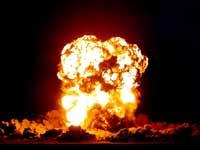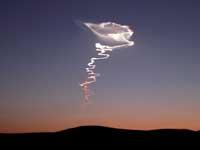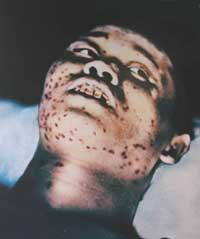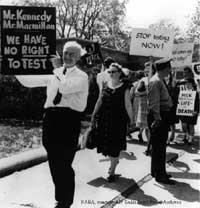Missile smoke
2003/03/02 Roa Zubia, Guillermo - Elhuyar Zientzia

I am tired. I spent all day in front of the computer or inside the car. So back home I'm exhausted. Exploded… Often said! Lately, when you talk about anything related to the verb explodes, Iraq comes to mind.
However, I have tried to immerse myself in my comfort and forget about explosive issues. But no. There are things that are very difficult to banish from the head, which, looking anywhere, re-emerge. After looking inside the fridge, I decided to open some canned canister. Sardines or mussels? Sardines, that is. But the food collected in the metal also has today a bad smell of war.
When Napoleon went to war with his gudaris, he carried out endless campaigns until he achieved a goal. To dominate a city or, rather, a whole territory. Of course, it was impossible to predict how long the campaign would last. The Russian, for example, was the hardest for them, as they had to fight trapped by winter and when they took Moscow, they found the city burned, that is, they could not find food. And that has to do with my sardines?
The truth is yes. At that time, the need to feed the army paved the way for canning. Napoleon knew that provision could be the basis of success. He therefore offered a £12,000 prize for those who invented the best system for long lasting food.

The prize went to the French Nicolas Appert in 1810. He studied sterilization systems and made airtight containers to store food inside. That same year the English Peter Durand patented a metal can.
The invention was perfect. Each of the soldiers ate the ration daily in a closed, airtight metal container and lasted very well for a long time; the war could last a long time without feeding.
Abdominal pain
I opened my can and started eating sardines. There are sweets. The invention of war, but today it is essential. I wondered if in Napoleon, without war, a can of sardines would be invented. I want to think so. It is surprising, but a simple can can cause a problem of ethics for a few days.
No joke. The arms of war have come everywhere. What would happen, for example, if after eating all sardines I had abdominal pain?
I know, today I am pessimistic. However, I would go to the doctor, running. Medicine saves lives, it is not like war. It is the opposite. However, if we look at the history of medicine, we find something surprising: war helped medicine a lot.

XIX. At the beginning of the 20th century, in the search for the origin of diseases, statistics were often applied. If the patients of the same symptom ate the same thing, for example, the problem was that food. Or if all the sick lived in a very dirty environment, it was to be assumed that we had to reflect on cleanliness, right?
However, many patients were needed to help find the origin of a disease. The more examples, the more reliable the conclusion was. In short, XIX. The doctors of the twentieth century began to apply mathematics, but only in situations where there were many sick. And these situations occurred mainly in plagues and wars. Again the war.
Without war
I have remained thoughtful. They are only a few examples of cases that have served the science of war. But there are many more. So what? Should war be recognized as the main promoter of science? Is war for new knowledge essential? Is the smoke left by the missile a benefit to science?
There is another option. Another option is to reject war. Science will advance without war. And I don't say it myself. American Linus Pauling said it over and over again. And perhaps my opinion is despicable, but that of Pauling is not.

Biochemists will remember Pauling, a prestigious scientist. In 1954 he won the Nobel Prize in Chemistry for finding the helix of proteins. It is not simple, it is the basic structure of many proteins and is currently taught in biochemistry books. He also participated in many other studies.
But he also received another Nobel Prize in 1962: Nobel Peace Prize. He was given this award for being a great anti-war activist.
The bombs dropped in Hiroshima and Nagasaki cleaned two million people and the world accepted it. But some did not accept these bombs. Among them were Linus Pauling and his wife Ava Helen, who at numerous conferences made public their opinion against nuclear tests and attended the demonstrations frequently. Faced with this attitude, the United States denied Pauling's passport in 1952, but the echo of the Nobel Prize has reached us. This story is worth telling.
Pauling has solved my doubt: science does not need war. "I think you can disarm everyone," he said. And I have believed him.
Published in 7K.

Gai honi buruzko eduki gehiago
Elhuyarrek garatutako teknologia




